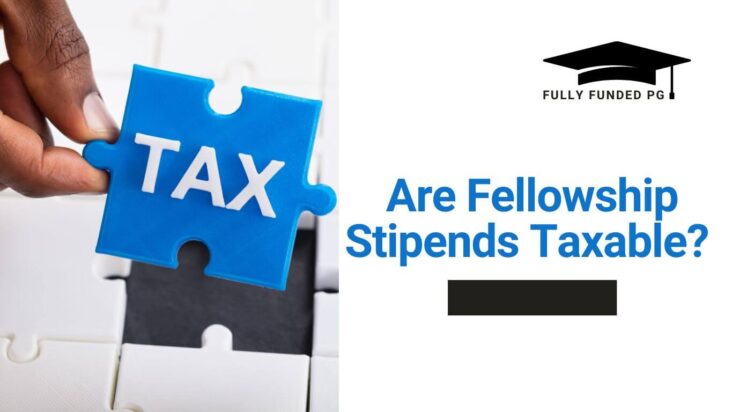Landing a fellowship can feel like winning the academic jackpot, free funding, flexible research opportunities, and the chance to focus on your studies or projects without the financial stress of student loans. But with great funding comes a not-so-glamorous question: Do I have to pay taxes on my fellowship stipend? It’s a concern that many recipients, especially first-timers, overlook until tax season rolls around.
The truth is, fellowship stipends don’t follow a one-size-fits-all tax rule. Depending on your country, how the funds are used, and whether they cover qualified education expenses or personal living costs, your stipend may be partially or fully taxable. In some cases, recipients find themselves owing taxes on income they didn’t even realize was considered taxable, leading to confusion, stress, or even unexpected penalties.
That’s why it’s essential to understand the tax implications before the money hits your account. In this guide, we’ll break down what counts as taxable fellowship income, how different tax systems treat stipends, and what steps you can take to report correctly and avoid costly mistakes.
Whether you’re a grad student in the U.S., a researcher on an international grant, or applying for your first academic award, this article will help you navigate the financial fine print with confidence.
What Is a Fellowship Stipend?
A fellowship stipend is a financial award granted to students, researchers, or early-career professionals to support their academic, research, or professional development, often during graduate studies, postdoctoral work, or specialized projects. Unlike a traditional salary, a stipend isn’t typically tied to employment or specific work output. Instead, it’s awarded based on merit, academic excellence, or a compelling research proposal, and is meant to ease the financial burden of pursuing education or research full-time.
Fellowship stipends can come from a wide range of sources. Universities often fund internal fellowships for graduate students, while government programs like the Fulbright Program or Erasmus+ support international academic exchange. Nonprofits, foundations, and major research institutions also offer fellowships aimed at promoting innovation, public service, or social impact across disciplines. In some cases, these awards are fully funded, covering tuition, travel, research costs, and living expenses, while others may offer partial support, with a monthly stipend being the central benefit.
Whether you’re studying at home or abroad, fellowships provide critical financial support without the obligation of repaying loans. However, because stipends aren’t treated like conventional wages, they often fall into a gray area when it comes to tax law. Understanding the nature and source of your stipend is the first step in figuring out how it may be taxed.
Are Fellowship Stipends Taxable in the U.S.?
Fellowship stipends can be taxable in the United States, depending on how the funds are used. The IRS has clear guidelines that separate qualified educational expenses from non-qualified personal expenses, and only the former are tax-exempt.
According to the IRS:
- Tax-Free: The portion of your fellowship used to pay for qualified education expenses, such as tuition, mandatory fees, books, supplies, and required equipment, is not taxable. These must be essential to your course or program of study.
- Taxable: Any part of your stipend spent on non-qualified expenses, including housing, meals, travel, health insurance, and optional equipment, is considered taxable income, even if it supports your education indirectly.
It’s important to note that fellowship stipends often don’t come with a traditional W-2 or 1099 form. However, you’re still legally responsible for reporting the taxable portion on your annual tax return, typically using Form 1040. Many students and researchers overlook this step and end up facing unexpected tax bills or penalties later.
Are International Fellowships Taxable?
When it comes to international fellowships, such as the Erasmus Mundus Joint Master Degrees (EMJMDs) under the Erasmus+ Programme, the question of taxability becomes more complex. Whether or not your stipend is taxable largely depends on a few key factors:
- Your home country’s tax laws: Some countries consider all income, including international educational stipends, as taxable, while others provide exemptions for academic grants or scholarships.
- Tax treaties between countries: Bilateral tax agreements between your home country and the country providing the fellowship may influence whether your stipend is subject to local taxation or eligible for exemption.
- How the stipend is classified: The way your fellowship is defined, whether as a grant, scholarship, research allowance, or employment-related compensation, can affect its tax status.
In many European countries, particularly within the Erasmus+ framework, fellowship stipends are generally not taxed, as they’re considered non-compensatory educational grants. However, this isn’t universally true. Some jurisdictions may tax portions of your stipend, especially if they’re used for living expenses or if the grant is tied to work responsibilities.
Bottom line: Always consult a local tax advisor or revenue authority to clarify your tax obligations before assuming your international stipend is tax-free. The rules vary widely—and ignorance can be costly.
Common Tax Scenarios for Fellowship Recipients
Fellowship taxation isn’t one-size-fits-all. Your tax responsibilities can vary depending on your academic level, nationality, the type of fellowship you receive, and how the funding is disbursed. Below are three typical scenarios that illustrate how fellowship stipends are taxed in different situations:
- U.S. Graduate Student on a Fellowship
- Tuition and required fees covered by the fellowship are tax-free under IRS guidelines.
- However, if the student receives a monthly stipend used for rent, food, or other living expenses, that portion is considered taxable income.
- Even without a W-2 or 1099 form, the student must report the taxable portion on Form 1040 during tax season.
- Tuition and required fees covered by the fellowship are tax-free under IRS guidelines.
- International Student on an Erasmus+ Fellowship
- In many European countries, the entire stipend is often tax-exempt, as Erasmus+ is classified as an educational grant.
- If local tax laws explicitly exclude educational fellowships from taxation, recipients may not need to file a tax return at all.
- Still, it’s wise to confirm with a local tax authority to avoid surprises.
- In many European countries, the entire stipend is often tax-exempt, as Erasmus+ is classified as an educational grant.
- Postdoctoral Fellow Paid Through a Research Grant
- In this case, the fellowship may not be classified as a scholarship but rather as personal or self-employment income, making the entire amount taxable.
- Because no taxes are withheld, the recipient may be required to file quarterly estimated taxes with their local tax authority or the IRS.
- Keeping detailed records of how funds are used is essential for accurate reporting.
- In this case, the fellowship may not be classified as a scholarship but rather as personal or self-employment income, making the entire amount taxable.
How to Determine if Your Fellowship Stipend is Taxable
Before assuming your fellowship is tax-free or taxable, it’s important to assess your situation carefully. Start by asking yourself: Is the money you’re receiving strictly used for qualified education expenses, such as tuition, required fees, books, supplies, or essential equipment? If yes, that portion is likely tax-exempt in many countries, including the U.S.
Next, check whether you’ve received a formal tax document like a W-2, 1099, or an international equivalent. These forms often indicate that part, or all of your stipend, may be subject to tax and needs to be reported. Even if no document is issued, you could still be legally required to file, especially in the U.S.
Also, consider whether your fellowship is linked to services rendered, such as teaching, lab assistance, or research tied to a grant. In many cases, when a stipend is compensation for work, it becomes taxable income, even if you’re a student.
Finally, look into tax treaties between your home country and the country funding or hosting the fellowship. Some treaties offer exemptions or reduced tax rates for academic grants, while others do not. This is especially crucial for international students and researchers.
By answering these questions honestly and clearly, you’ll be in a better position to determine your tax obligations and avoid compliance issues later on.
Tips for Managing Fellowship Taxes
- Keep Detailed Records: Track how you use your stipend (tuition, books, rent, etc.)
- Save for Taxes: Set aside a portion of your stipend if it’s taxable
- Consult a Tax Professional: Especially important for international students or those with complex funding
- File on Time: Know your country’s tax deadlines and required forms
- Use IRS Publication 970 (U.S. only): It’s the go-to guide for tax treatment of scholarships and fellowships
Conclusion
So, are fellowship stipends taxable? The short answer is: it depends. While many fellowships offer crucial financial support for your academic or professional journey, they also come with important tax considerations. In countries like the U.S., stipends used for qualified education expenses, such as tuition, mandatory fees, books, and supplies, are generally not taxed. However, any portion spent on living expenses like rent, meals, transportation, and health insurance is usually considered taxable income.
For international students and scholars, programs like the Erasmus+ Scholarship or Fulbright Fellowship often provide tax-exempt funding, but the rules vary widely depending on your home country’s tax laws, local regulations, and international tax treaties. Just because no tax form lands in your mailbox doesn’t mean you’re exempt; you are still responsible for reporting and possibly paying tax on the applicable portions.
Ultimately, whether you’re a grad student trying to navigate your first stipend or a postdoc juggling multiple sources of funding, understanding your tax obligations is as essential as your research or coursework. Consult a tax advisor, read the fine print of your fellowship agreement, and stay proactive about your financial responsibilities. It’s the smartest way to protect your funding, and your peace of mind.

